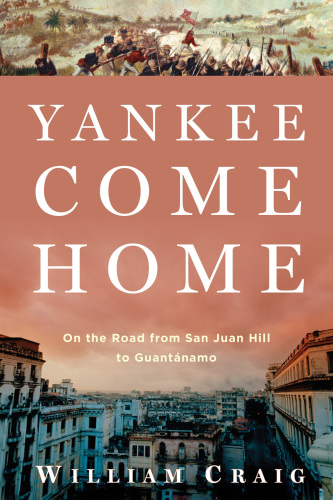
Yankee Come Home
On the Road from San Juan Hill to Guantánamo
کتاب های مرتبط
- اطلاعات
- نقد و بررسی
- دیدگاه کاربران
نقد و بررسی

May 14, 2012
Freelance journalist and professor (River Valley Community College, N.H.) Craig combines an investigator’s eye with academic research to present a disturbing account of the U.S.’s relationship with Cuba. He traveled there “because there’s a Cuban bay that’s been a U.S. naval base since 1898..... because my stepson is standing guard behind a machine gun... in Iraq... because patriotism has begun to feel like grief.” Craig details Cuba’s history from its time as a Spanish colony through his trip in 2005 that is the genesis of his account. He maintains objectivity through that factual presentation, even though his personal politics are never far from the surface. Craig admires the Cubans, and his observations of the differences and nuances between our languages and cultures informs his presentation. There is, however, no empathy for the Communist regime or for U.S. policy, “where we ditched our republican ideals for the charms of empire,” with what is known to us as the Spanish-American War. In the end, Craig’s is a persuasive condemnation of U.S. foreign policy. Agent: Wendy Strothman.

July 1, 2012
With a half-century of U.S. antagonism to Cuba's revolution as the back story, a freelancer visits the island nation to report on both its history and current situation. Craig (Liberal Arts/River Valley Community Coll.) accompanied a touring chorus to gain access to the beleaguered communist outpost. Abandoned by the group's guide, he made his own way, curious to see where his great-grandfather may have fought. Starting with Santiago de Cuba, where Theodore Roosevelt famously charged up San Juan Hill, Craig recalls the bellicose Roosevelt, cautious McKinley and the American takeover of the Cuban rebellion against Spanish rule. The author's lively history follows locale, not chronology, and he analyzes sugar politics, empire building and the blood-spattered history of slaves, Indians and Spaniards in the New World. The author doesn't cover the story of the sinking of the USS Maine, the ostensible casus belli for the Spanish-American War, until more than halfway through the text. We also learn about Cuban culture, including music, spirits, the real Che Guevara, pickpockets, drinking habits and much more. Craig's sprightly account ends back east with a surreal encounter with the local authorities in the town of Guantanamo as he tries to gain a view of the ominous American base. The Spanish-American War was the quintessential journalists' adventure. Craig beats his professional predecessors with his skilled and accessible personal journal and blunt history.
COPYRIGHT(2012) Kirkus Reviews, ALL RIGHTS RESERVED.

Starred review from July 1, 2012
Freelance journalist Craig (liberal arts, River Valley Community Coll.) has a story to tell. After years of hearing that his great-grandfather fought with Teddy Roosevelt on San Juan Hill, he sought to connect with the past and retrace his ancestor's steps; this book is the result. His adventures in Cuba ultimately involve a dubious Nigerian missionary, a New England feminist choir, and a family secret. Though his travels don't work out as planned, Craig forges on. As they say on the island: "Estamos en Cuba." Readers experience Afro-Cuban religious ceremonies, brush-ups with the ever-present secret police, plenty of rum, and several hours on terrible Cuban transportation. VERDICT This memoir could have disintegrated into a slapstick account of a Nigerian scam artist, inflexible Cuban bureaucrats, and the woes of a crumbling Cuban infrastructure. Instead, Craig has crafted a nuanced, coherent account of the Spanish-American War (remember the Maine?) interspersed with recent Cuban history and the current reality; the book is also a family memoir and quirky travelog. Recommended for anyone interested in Cuba or the Spanish-American War.--Lee Arnold, Historical Soc. of Pennsylvania, Philadelphia
Copyright 2012 Library Journal, LLC Used with permission.

July 1, 2012
Based on his trip to Cuba in 2005, Craig's multipronged account shifts among the events of his journey, thoughts on Cuban culture, an ancestor whom family lore had charging up San Juan Hill in 1898, and his critical views of the history of American-Cuban relations. The Spanish-American War holds these parts together as Craig summarizes Cuban insurrections against the Spanish and the destruction of the Maine, which furnished the American casus belli. Amid his narrative accounts and minibiographies of Cuban patriots like Jose Marti, Craig displays open-minded interest in the contemporary Cubans he meets, listening to their stories of life under communism, sometimes in a formal interview; sometimes in motion on bus, train, or taxi; sometimes on visits to local historical and religious landmarks in the city of Santiago de Cuba, where he spent most of his time. Ultimately revealing the veracity of his great-grandfather's martial exploits as well as describing his encounter with secret police that belies his otherwise neutral commentary about the regime, Craig advances views amid his adventures that partake of debate about Cuban history.(Reprinted with permission of Booklist, copyright 2012, American Library Association.)

























دیدگاه کاربران